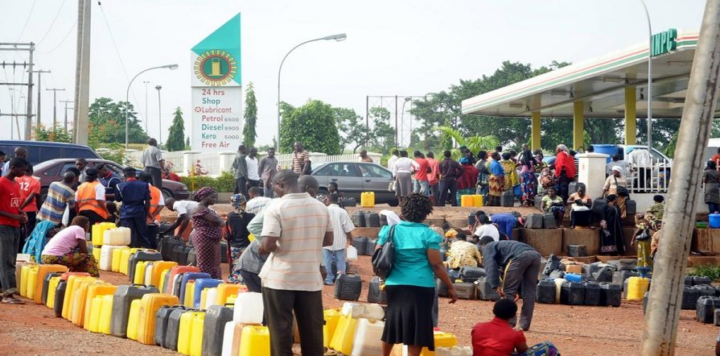A comprehensive examination of petrol stations in Abuja during the past weekend has unveiled a notable decline in the demand for this essential commodity among Nigerian consumers. The diminishing interest in purchasing petrol for personal vehicles is indicative of several concurrent trends that have unfolded in the Federal Capital Territory (FCT).
Notably, the surge in petrol prices, combined with the inherent inconveniences and stresses associated with queuing at filling stations, has propelled many Nigerians to seek alternative transportation solutions. To provide a more detailed perspective on these developments, InfoStride News undertook a review of the evolving situation in the FCT.
1. Petrol Stations Shutting Down
One of the prominent trends observed was the closure of several petrol stations, particularly those operated by independent marketers, across the city. Although some stations under the Nigerian National Petroleum Company Limited (NNPCL) remained in operation, many privately-owned stations were open for business but refrained from dispensing fuel from all their pumps. This selective service approach inevitably led to queues at these stations, although the lines were not as extensive as they had been in the past.

A source within the Independent Marketers Association of Nigeria (IPMAN) disclosed to InfoStride News that the return of NNPCL as the sole importer of petrol into the country had posed significant challenges for private marketers. The fluctuations in foreign exchange rates and the corresponding forex volatility had made it increasingly arduous for these independent marketers to secure a consistent supply of petrol. Consequently, there was a noticeable gap in supply, as many of these private marketers found themselves without petrol. They were unable to rely on NNPCL for supplies, as the national company also struggled to meet the growing demand, resulting in overstretching of their resources.
2. Decreased Demand for Petrol
Several residents of the Federal Capital Territory expressed their growing discontent with the arduous process of queuing for petrol. They cited the substantial stress and high costs as discouraging factors. Over the weekend, a significant number of individuals shared their reluctance to endure lengthy queues, particularly in light of the current high fuel prices.
For these residents, the choice to opt for public transportation and pay a premium for this service became increasingly viable when contrasted with the inconvenience and financial burden associated with queuing to purchase petrol at exorbitant rates, which ranged between N615 to N620 per liter.
Ediri Thomas, for instance, emphasized his frustration and the impracticality of queuing for petrol. These factors led him to make a conscious decision to temporarily park his car and seek alternative means of transportation. He transitioned to public transportation and walking to fulfill his daily commuting requirements. Thomas expressed his sentiment, stating, “When petrol was priced at N185 per liter, I could at least fill up my tank conveniently after queuing, but I wouldn’t consider doing that now.”
3. Ride-Hailing Drivers Going Offline
Another noteworthy observation in Abuja pertained to the increasing unavailability of petrol, prompting ride-hailing taxi drivers to adapt to an offline business approach. This shift occurred after a customer had booked a ride through the ride-hailing company’s app.
In this context, specific drivers requested their customers to carry out the transaction offline, thereby facilitating immediate cash transactions. This approach allowed them to promptly purchase fuel from designated NNPCL petrol stations or other available options. Notably, this practice was particularly prevalent among drivers who anticipated the possibility of earning more from a ride.
The rising demand for ride-hailing taxi services came as a direct consequence of urban residents choosing to leave their personal vehicles parked at home. The combination of increased fuel prices and the hassle of procuring petrol had incentivized people to seek alternative means of transportation, further stimulating the ride-hailing industry.
In sum, these evolving trends in Abuja’s petrol consumption landscape underscore the complex and multifaceted challenges faced by both consumers and businesses. The high fuel prices, paired with the inconvenience of queuing, have led Nigerians to explore alternative modes of transportation, with ride-hailing services experiencing a surge in demand. These changes reflect the broader economic and logistical challenges facing the country’s petroleum industry and have prompted a shift in consumer behavior and preferences.
Support InfoStride News' Credible Journalism: Only credible journalism can guarantee a fair, accountable and transparent society, including democracy and government. It involves a lot of efforts and money. We need your support. Click here to Donate
